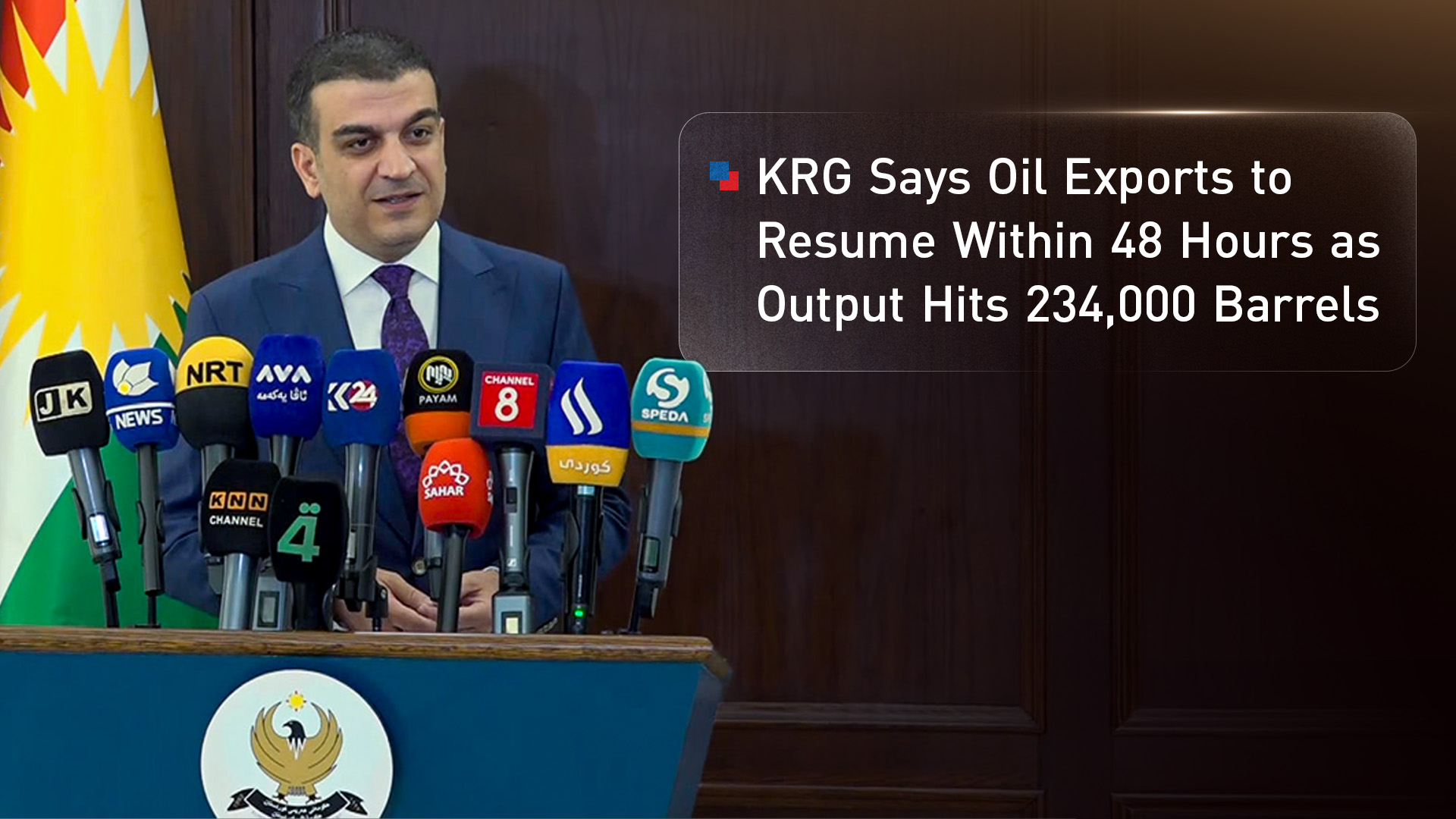KRG Says Oil Exports to Resume Within 48 Hours as Output Hits 234,000 Barrels
The deal is a temporary three-month arrangement until Iraq’s 2026 federal budget is approved, says the KRG.

ERBIL (Kurdistan24) — Kurdistan Regional Government (KRG) spokesperson Peshawa Hawramani announced on Wednesday that the Region’s oil production has reached 234,000 barrels per day, with exports expected to resume within the next 48 hours under a new trilateral framework agreement.
Speaking at a press conference in Erbil on Wednesday, Hawramani explained that part of the oil is used domestically to meet the Kurdistan Region’s internal needs, while the remainder will be handed over to Iraq’s state-owned SOMO company for export.
He described the agreement between the KRG, Iraq’s Ministry of Oil, and international production companies as a “significant step forward,” noting that minor technical objections by one or two firms would not block exports.
According to Hawramani, the arrangement is temporary, lasting three months until Iraq’s 2026 federal budget is finalized. He stressed that the KRG has consistently sought to resolve disputes with Baghdad “in line with the constitution and law,” and that Erbil has never created obstacles to oil exports or budget transfers.
The spokesperson also revealed that the KRG transferred 120 billion Iraqi dinars from its internal revenues to Baghdad’s Ministry of Finance to ensure the disbursement of public sector salaries in the Region.
He confirmed that salaries for July will be distributed as soon as funds arrive, while the payroll list for August has already been submitted to the federal government.
Hawramani underscored that the Region is not only seeking salaries but also its full share of the federal budget: “The rights of the people of Kurdistan are guaranteed by the constitution, and we will not abandon them.”
On Baghdad’s recent State Shura Council opinion regarding oil revenue transfers, he clarified that it was merely an advisory note and not a binding court ruling.
“This is not a decision; it is simply their opinion,” Hawramani said, reiterating that the KRG had not requested such an opinion in the first place.
The announcement comes amid ongoing efforts to resolve a long-standing dispute over oil exports between Erbil and Baghdad. Since March 2023, Kurdish crude exports through Turkey’s Ceyhan port have been suspended following an international arbitration ruling in favor of Baghdad.
Earlier in the day, the Kurdistan Region’s Ministry of Natural Resources (MNR) stated that it has fully implemented its obligations regarding the resumption of oil exports through Iraq’s federal framework and is now waiting for the Iraqi Ministry of Oil to sign off on the trilateral agreement that would allow state marketer SOMO to restart Kurdistan Region oil exports.
In a statement, the MNR said it had complied with all decisions and instructions issued by the Iraqi Council of Ministers and had officially informed both domestic and international oil companies to align with the new framework.
The halt has cost both the KRG and Iraq billions of dollars in lost revenue and strained public finances, particularly in the Kurdistan Region, where public salaries rely heavily on oil income.
Efforts to restart exports have repeatedly stalled over technical and political disagreements, including who has the final say over production contracts and revenue management.
Baghdad has often leveraged budget transfers as political pressure, while the KRG has accused the federal government of undermining the Region’s constitutional rights.
Kurdish officials maintain that Erbil has acted in good faith and shown flexibility, while Baghdad continues to delay implementation and use financial entitlements as a political weapon.
Such tactics not only punished the people of Kurdistan but also weakened Iraq’s federal system by ignoring constitutional commitments. For many in the Kurdistan Region, the resumption of exports is less about technical fixes and more about ensuring that Baghdad treats the Region as a genuine federal partner, not a subordinate.